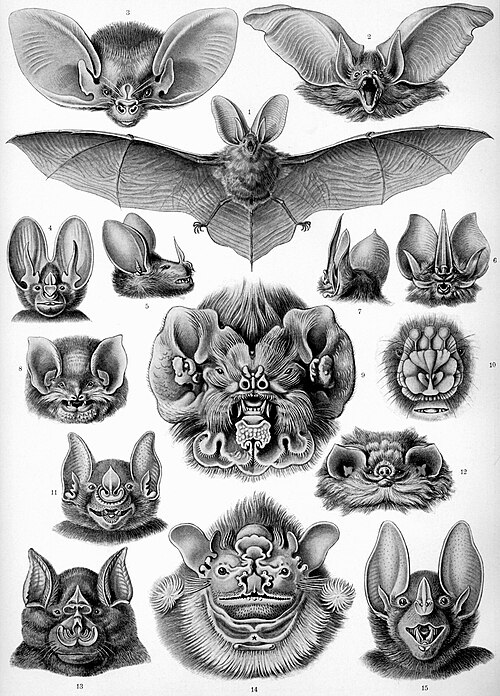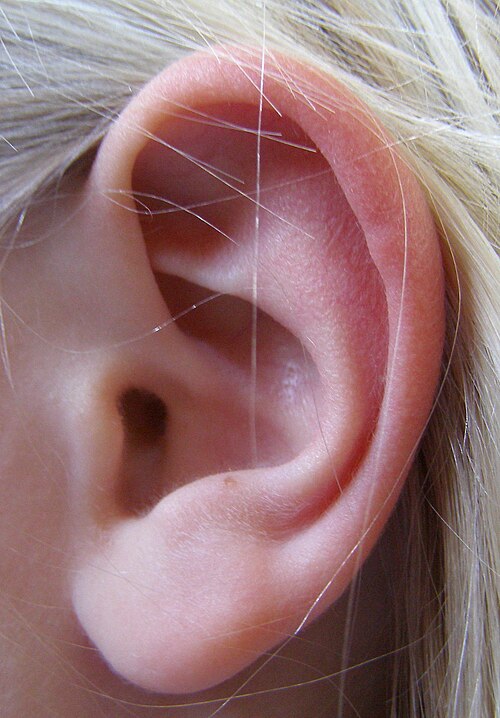Earnoun
(countable) The organ of hearing, consisting of the pinna, auditory canal, eardrum, malleus, incus, stapes and cochlea.
Earnoun
(countable) The external part of the organ of hearing, the auricle.
Earnoun
A police informant.
Earnoun
The sense of hearing; the perception of sounds; skill or good taste in listening to music.
Earnoun
The privilege of being kindly heard; favour; attention.
Earnoun
That which resembles in shape or position the ear of an animal; a prominence or projection on an object, usually for support or attachment; a lug; a handle.
Earnoun
(architecture) An acroterium.
Earnoun
(architecture) A crossette.
Earnoun
(countable) The fruiting body of a grain plant.
Earverb
(humorous) To take in with the ears; to hear.
Earverb
(intransitive) To put forth ears in growing; to form ears, as grain does.
Earverb
(archaic) To plough.
Earnoun
The organ of hearing; the external ear.
Earnoun
The sense of hearing; the perception of sounds; the power of discriminating between different tones; as, a nice ear for music; - in the singular only.
Earnoun
That which resembles in shape or position the ear of an animal; any prominence or projection on an object, - usually one for support or attachment; a lug; a handle; as, the ears of a tub, a skillet, or dish. The ears of a boat are outside kneepieces near the bow. See Illust. of Bell.
Earnoun
Same as Acroterium.
Earnoun
Privilege of being kindly heard; favor; attention.
Earnoun
The spike or head of any cereal (as, wheat, rye, barley, Indian corn, etc.), containing the kernels.
Earverb
To take in with the ears; to hear.
Earverb
To put forth ears in growing; to form ears, as grain; as, this corn ears well.
Earverb
To plow or till; to cultivate.
Earnoun
the sense organ for hearing and equilibrium
Earnoun
good hearing;
Earnoun
the externally visible cartilaginous structure of the external ear
Earnoun
attention to what is said;
Earnoun
fruiting spike of a cereal plant especially corn
Earnoun
the organ of hearing and balance in humans and other vertebrates, especially the external part of this.
Earnoun
an organ sensitive to sound in other animals.
Earnoun
an ability to recognize, appreciate, and reproduce sounds, especially music or language
Earnoun
used to refer to a person's willingness to listen to others
Earnoun
the seed-bearing head or spike of a cereal plant.
Earnoun
a head of maize.
Ear
The ear is the organ that enables hearing and, in mammals, balance. In mammals, the ear is usually described as having three parts—the outer ear, the middle ear and the inner ear.
Eirdeterminer
(rare) Belonging to em, gender-neutral third-person singular possessive adjective, equivalent to the singular his and her.}}
Eir
In Norse mythology, Eir (Old Norse ) is a goddess or valkyrie associated with medical skill. Eir is attested in the Poetic Edda, compiled in the 13th century from earlier traditional sources; the Prose Edda, written in the 13th century by Snorri Sturluson; and in skaldic poetry, including a runic inscription from Bergen, Norway from around 1300.



















